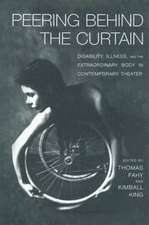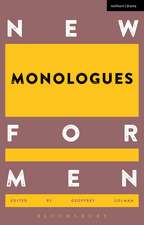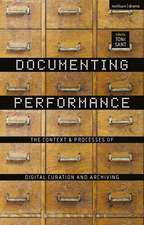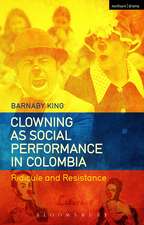A Philosophy of Comedy on Stage and Screen: You Have to be There
Autor Shaun Mayen Limba Engleză Paperback – 24 aug 2016
| Toate formatele și edițiile | Preț | Express |
|---|---|---|
| Paperback (1) | 235.71 lei 6-8 săpt. | |
| Bloomsbury Publishing – 24 aug 2016 | 235.71 lei 6-8 săpt. | |
| Hardback (1) | 654.83 lei 6-8 săpt. | |
| Bloomsbury Publishing – 16 dec 2015 | 654.83 lei 6-8 săpt. |
Preț: 235.71 lei
Preț vechi: 271.73 lei
-13% Nou
Puncte Express: 354
Preț estimativ în valută:
45.10€ • 47.09$ • 37.33£
45.10€ • 47.09$ • 37.33£
Carte tipărită la comandă
Livrare economică 04-18 aprilie
Preluare comenzi: 021 569.72.76
Specificații
ISBN-13: 9781350004511
ISBN-10: 1350004510
Pagini: 224
Dimensiuni: 138 x 216 x 18 mm
Greutate: 0.26 kg
Ediția:NIPPOD
Editura: Bloomsbury Publishing
Colecția Methuen Drama
Locul publicării:London, United Kingdom
ISBN-10: 1350004510
Pagini: 224
Dimensiuni: 138 x 216 x 18 mm
Greutate: 0.26 kg
Ediția:NIPPOD
Editura: Bloomsbury Publishing
Colecția Methuen Drama
Locul publicării:London, United Kingdom
Caracteristici
Offers a fresh consideration of both highbrow and popular comedy, drawing commonalities between Kafka's Metamorphosis and Family Guy, in order to elucidate the general phenomenon of humour
Notă biografică
Shaun May is a Lecturer in Drama and Theatre at the University of Kent, UK. Prior to joining the faculty at Kent he was an AHRC Postdoctoral Research Associate in the Philosophy department of the University of Liverpool and he taught at the Royal Central School of Speech & Drama and the Royal College of Art, UK. He is co-convenor of the London Comedy Forum, a network of researchers with an interest in comedy and humour.
Cuprins
Introduction 1. You Have to Be There 2. Phenomenology of Object Dysfunction 3. Phenomenology of Object Anthropomorphism 4. Phenomenology of Animal Anthropomorphism 5. Phenomenology of Physical ImpairmentConclusionEndnotesIndex
Recenzii
Shaun May's book is an engaging study of the philosophy of comedy, offering erudite case-studies drawn from a variety of genres. Its main reference point, namely the philosophy of Martin Heidegger, makes it accessible also to undergraduates of philosophy, besides humour scholars ... Its interdisciplinary scope brings into fruitful dialogue philosophy, on the one hand, and theatre, film and contemporary performance, on the other.
A strong exploration of how the philosophical writing of Martin Heidegger and others may be interwoven with our interpretation of comic performances. The result effectively illuminates comic engagement, Heidegger's writing in particular, and ultimately, how jokes and laughter may be thought of as intrinsic to what makes us human . May convincingly demonstrates the broad implications of Heidegger's 'Dasein' to more thoroughly unpack specific comedic moments, genre aside. This is but one of several great strengths of May's book . This book is a welcome addition to the libraries of scholars in humor studies, performance studies, disability studies, and philosophy . An original, thoughtful voyage that departs interestingly from the theoretical fare of late.
May is able to frame the humour of his case studies as philosophically pertinent without thereby restricting their potential to surprise and delight us. I suspect that this is accomplished as much by May's crisp writing style and by his liberal supply of direct quotations from comedy as it is by any special lucidity in Heidegger's work.
May's research area (comedy on stage and screen) would be of major interest to students and scholars of performance, film, and humour. Its interdisciplinary scope brings into fruitful dialogue philosophy, on the one hand, and theatre, film and contemporary performance, on the other.
A strong exploration of how the philosophical writing of Martin Heidegger and others may be interwoven with our interpretation of comic performances. The result effectively illuminates comic engagement, Heidegger's writing in particular, and ultimately, how jokes and laughter may be thought of as intrinsic to what makes us human . May convincingly demonstrates the broad implications of Heidegger's 'Dasein' to more thoroughly unpack specific comedic moments, genre aside. This is but one of several great strengths of May's book . This book is a welcome addition to the libraries of scholars in humor studies, performance studies, disability studies, and philosophy . An original, thoughtful voyage that departs interestingly from the theoretical fare of late.
May is able to frame the humour of his case studies as philosophically pertinent without thereby restricting their potential to surprise and delight us. I suspect that this is accomplished as much by May's crisp writing style and by his liberal supply of direct quotations from comedy as it is by any special lucidity in Heidegger's work.
May's research area (comedy on stage and screen) would be of major interest to students and scholars of performance, film, and humour. Its interdisciplinary scope brings into fruitful dialogue philosophy, on the one hand, and theatre, film and contemporary performance, on the other.





























